Balancing China: Japan and Vietnam join hands in economy and security
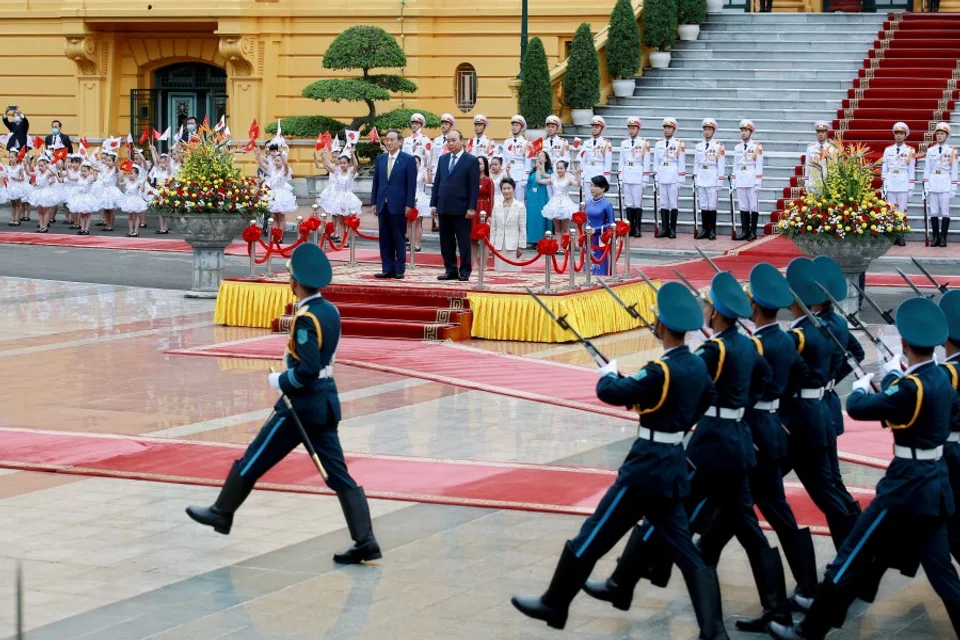
During his December 2013 visits to Vietnam, Thailand and Indonesia, former Japanese Prime Minister Shinzo Abe, said that strengthening Japan's relations with the countries of ASEAN is "indispensable for the peace and prosperity of the region while also being in Japan's national interests". Seven years later, Suga's overseas debut in Vietnam and Indonesia in October 2020 as prime minister reiterated Japan's ambition to strengthen ties with Southeast Asia in general and with Vietnam in particular.
Even before Covid-19 struck, Japan had been striving to lessen its economic dependence on China. The pandemic accelerated this process with Japan enhancing economic cooperation with Vietnam and diversifying its supply chains there. This should bolster Japan's economic presence in Vietnam and facilitate Tokyo's deeper economic engagement with Southeast Asia. At the same time, Japan is also keen to strengthen defence ties with Vietnam.
On its part, Vietnam is eager to boost ties with Japan in a reaffirmation of its omni-directional foreign policy. To some extent, it is also concerned with the rising tensions between the US and China, especially the impact on smaller countries such as Vietnam. In addition, Japan's and Vietnam's territorial and maritime disputes with China and their complex interactions with Beijing have contributed significantly to rising anxiety in Tokyo and Hanoi about living "in a new Sino-centric order".
Japan forging economic ties with Vietnam
Japan has been strengthening its economic ties with Vietnam over the years. In fact, it was the first G7 country to recognise Vietnam's market economy status in 2011. The Vietnam-Japan Economic Partnership Agreement (VJEPA) signed in December 2008 (and which came into effect in October 2009) provides a framework to promote trade and investment between the two countries. The ASEAN-Japan Comprehensive Economic Partnership (AJCEP) between Japan and the five ASEAN members (Laos, Myanmar, Singapore, Thailand, and Vietnam) implemented in December 2008 and amended in August 2020 further expands the areas of cooperation between Japan and ASEAN. These two frameworks created favourable conditions for forging Vietnam-Japan's economic ties.
Suga's visit further accelerates Japan's strategy of looking at Vietnam as an "attractive alternate destination for Japanese companies exiting China"...
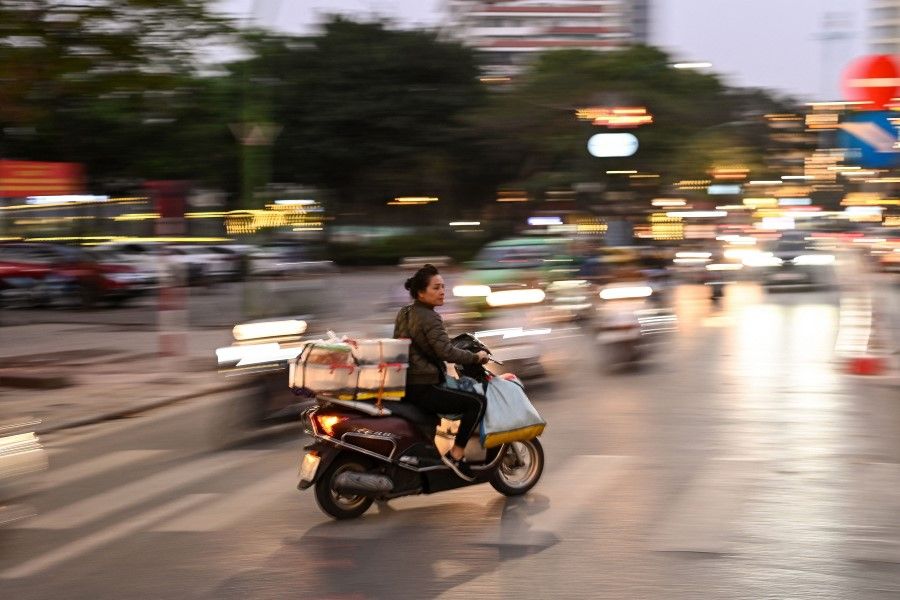
Apart from the above institutional arrangements, Japan and Vietnam have benefited from the complementary and non-competitive structure of their two economies. Among the 136 nations and territories investing in Vietnam, Japan is the biggest official development assistance (ODA) provider, at nearly US$24 billion in 2019; the second-biggest investor with US$1.73 billion in the first three quarters of 2020; and the fourth largest commercial partner with US$28.6 billion in two-way trade turnover between January and September 2020. As of September 2020, Japan had invested in about 4,600 FDI projects in Vietnam, with a total registered capital of about US$60 billion.
Bilateral economic ties were given a boost during Suga's visit. The two countries agreed to resume two-way commercial flights early and implement a "business track" that would allow short-term business travels of executives and workers without a mandatory 14-day quarantine. Suga further expressed Japan's support for Vietnam's effort to develop an e-government system, reaffirming Japan's earlier offer in January 2020 to share its experience and provide information technology equipment worth 500 million yen in ODA to develop such a system.
Suga's visit further accelerates Japan's strategy of looking at Vietnam as an "attractive alternate destination for Japanese companies exiting China", which has been in the works for some time. Amid the economic turmoil caused by Covid-19, Japan had earlier earmarked 23.5 billion yen as a stimulus package for its companies seeking to shift production to Southeast Asian countries. Due to its effective containment of Covid-19, cheap labour and stable politics, Vietnam has emerged as one of the biggest beneficiaries of the US-China trade war, especially as businesses look to relocate their operations. In his meeting with Suga, Vietnamese Prime Minister Nguyen Xuan Phuc expressed Vietnam's readiness to support Japanese investments, with a plan to accommodate its real estate and human resource needs.
In a 2019 online survey, conducted by NNA Japan Co., Japanese firms valued Vietnam as the most preferred destination in Asia to invest in 2020 due to its potential, such as "a growing market and large supply of skilled, low-cost labour", and its proximity to China. According to another 2019 survey by Japan External Trade Organisation on Japanese companies investing in Asia and Oceania, 63.9% of Japanese enterprises doing business in Vietnam are committed to augmenting their businesses in the next one to two years, the highest rate in ASEAN and the third in the Asia-Oceania region.
The slow decision-making process of Japanese executives accounted for the delay in the Japanese companies' outreach to Vietnam.
Putting investment bets on Vietnam
Vietnam's GDP growth was estimated at 2.12% for the first nine-month period of 2020, "the lowest 9-month growth rate in the past ten years" due to the pandemic. This growth rate is still commendable since most other ASEAN countries are grappling with negative growth. Japanese firms faring pretty well or being less hurt from Covid-19 could consider pumping more capital into Vietnam to capitalise on the country's relatively strong economic fundamentals.
During Suga's visit to Vietnam, Tokyo Gas Co., Marubeni Corp. and PetroVietnam Power Corp. signed two memoranda of understanding (MoU) to develop gas-fired power projects in Quang Ninh Province and Can Tho City. The first MOU by Tokyo Gas Co., Marubeni Corp. and PetroVietnam Power Corp. involves building a US$1.9-billion-plant for imported liquefied natural gas and is scheduled for commercial operation in 2026-2027. The second MOU involves Marubeni building a US$1.3 billion gas-fired power plant, which is expected to be completed in the fourth quarter of 2021 and be ready for trading operations in December 2025. These two plants, when ready, would help augment Vietnam's increasing energy needs and to some extent make up for Hanoi's current "declining gas production and offshore exploration challenges in the South China Sea amid territorial disagreements with Beijing".
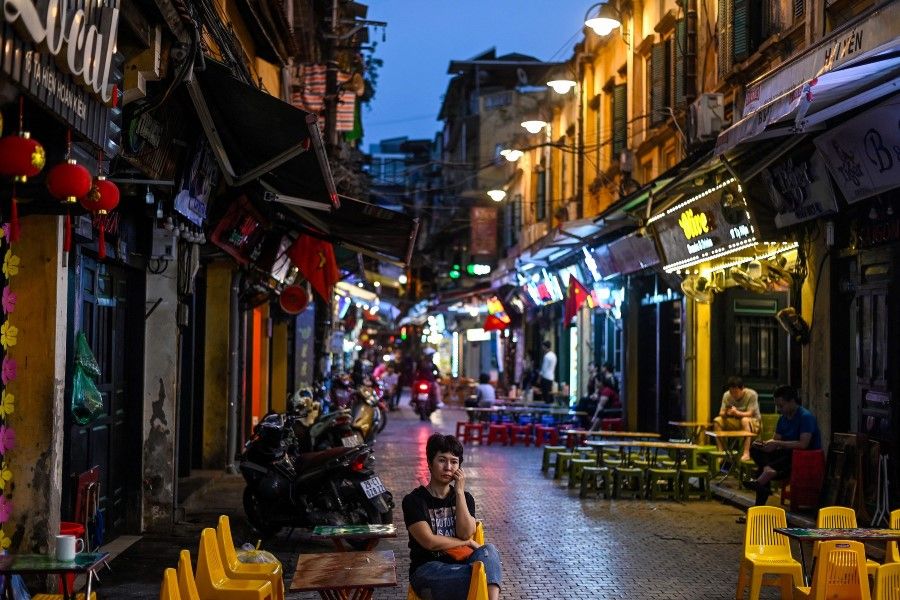
Once the biggest foreign investor in Vietnam (in 2018), Japan sank to fourth place in the first nine months of 2020, overtaken by Singapore, South Korea and China, respectively. The slow decision-making process of Japanese executives accounted for the delay in the Japanese companies' outreach to Vietnam. Japan's fall behind more "agile rivals" such a South Korea and China, has been due to the phenomenon of local Japanese representative offices having minimal authority in making big decisions, and the travel restrictions in place as a result of Covid-19 slowing down decision-making further. A possible solution to expedite Japanese investment into Vietnam is for the Japanese government to provide more effective support. On their part, Japanese companies must speed up their decision-making processes to seize the opportunities that Suga's visit underscore.
On Vietnam's part, it needs to proactively come up with favourable policies, notably in the fields of infrastructure and human resources, to attract relevant investments to help upgrade and restructure its economy. Currently, Vietnam relies heavily on overseas materials, as its industry mainly deals with processing and assembly processes. Its local enterprises are eager for "advanced governance experience and technologies of foreign partners from developed nations" to raise the quality of its exports. Vietnam can do more to capture Japanese FDI shifting out from China. Such inflows can provide Vietnam with modern technology and technique to elevate the level of its economic development.
Japan has embarked on a "more self-reliant course in defence and diplomacy" by promoting a more vigorous outreach to expand its strategic networks with Southeast Asian countries, with Vietnam as an anchor.
Strengthening defence and security ties
Since 2012, the Japan-Vietnam defence and security relationship has improved due to China's increased belligerence in the East and South China Seas. A shared concern on China's territorial ambitions has prompted Vietnam to adopt a soft balancing strategy against China, with Japan emerging as one of its "best and most powerful friends in Asia". Meanwhile, Japan has embarked on a "more self-reliant course in defence and diplomacy" by promoting a more vigorous outreach to expand its strategic networks with Southeast Asian countries, with Vietnam as an anchor.
In August 2013, Vietnam and Japan held their second Defence Policy Dialogue in Tokyo, which was much more significant than the first one in 2012 since it led to both sides agreeing to hold their vice-ministerial level meeting on an annual basis. At the same meeting, the two countries underscored the importance of international law, specifically the United Nations Convention on the Law of the Sea (UNCLOS), in resolving "disputes and differences on sea and island sovereignty issues" and reached an agreement on mutual support regarding marine research and capacity building. Shinzo Abe had identified in January 2013 that "ensuring that the seas, which are the most vital commons to us all, are governed by laws and rules, not by might" as one of the five key principles of Japan's diplomacy.
There was also closer navy-to-navy cooperation. In July 2013, for the first time, the Kojima, a training vessel from the Japanese Coast Guard (JCG), docked at Tien Sa Port of Da Nang for a five-day visit. Though Vietnam and Japan's coast guards have maintained a cooperative relationship since 2000, the JCG visit to Da Nang was crucial since it occurred after Japan's 2012 nationalisation of the Senkaku Islands (Diaoyu in Chinese) in the East China Sea (which significantly strained Sino-Japanese relations). Since then, Japan has stepped up naval ship visits to Vietnam.
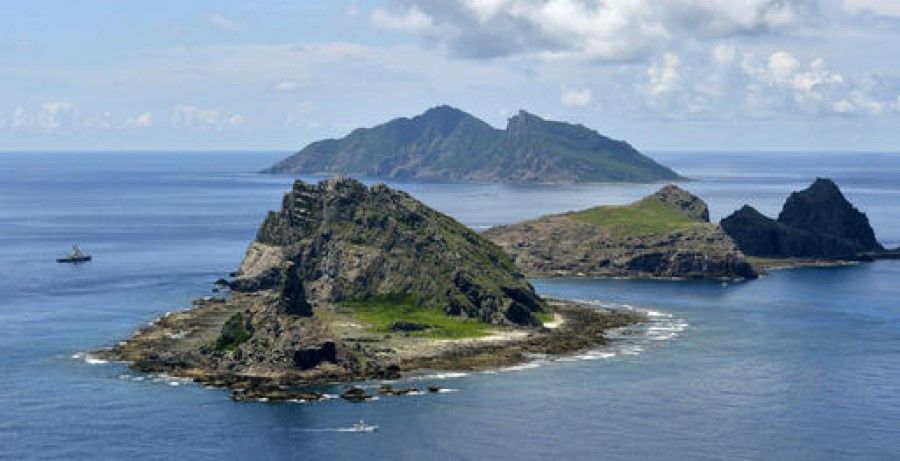
In 2014, Japan transferred six used patrol vessels to Vietnam worth US$5 million, nearly two weeks after the oil rig standoff between Vietnam and China in the Paracel Islands. Given Japan's own disputes with China over the Senkaku Islands, Japan's offer was equivalent to an "alignment" of sorts with Vietnam. In September 2015, Vietnam and Japan signed a separate deal, laying a foundation for Tokyo to sell more naval vessels to Vietnam in the future.
Both countries further strengthened their defence and security ties with a deal worth US$350 million in June 2017 to upgrade Vietnam's coast guard vessels and patrol capabilities. With a shared "deep concern over the complex developments" involving Beijing in the South China Sea, Abe and his Vietnamese counterpart Nguyen Xuan Phuc affirmed then that Tokyo's maritime material and technology transfer to Hanoi was designed to strengthen "a free and open international order based on the rule of law".
In September 2018, the docking of Japan's Maritime Self-Defense Force submarine Kuroshio at Cam Ranh International Port while carrying out its first submarine drill in the South China Sea was significant for a number of reasons. First, Japan's first submarine visit to Vietnam indicated Tokyo's intention for firmer defence cooperation with Hanoi. Second, it portrayed a sort of informal security alignment between the two like-minded states, with Vietnam viewing Japan as a strategic partner in its "omnidirectional foreign policy", and Japan viewing Hanoi as a "key node in its greater engagement of Southeast Asia and as part of its own Indo-Pacific strategy".
In October 2019, the Japanese Defence Minister Takeshi Iwaya and his Vietnamese counterpart, Ngo Xuan Lich, signed another "defence cooperation and exchange" memorandum that "prescribed regular vice-ministerial level talks" and facilitated more Japanese ports-of-call in Vietnam. In March 2020, Japan agreed to transfer military shipbuilding technology to Vietnam, continue high-level defence contacts, and strengthen ties between the Vietnamese Army and Japan's Ground Self-Defense Force.
In July 2020, the Japan International Cooperation Agency inked a loan agreement with the Vietnamese government to provide Vietnam with six coast guard patrol boats worth US$345 million. The project was "the first maritime patrol ship deal" between Tokyo and Hanoi, pledged by Abe in 2016, and will "provide the Vietnam Coast Guard with financing to procure vessels, supporting an improvement in maritime rescue operations and maritime law enforcement".
During his October 2020 visit, Suga went further to promise in principle to transfer defence gear and technology to Vietnam, including patrol planes and radar. Suga described this as a "big step in the field of security for both countries", especially in improving Vietnam's surveillance capabilities. This also benefits Japan. Since its embargo on arms exports was lifted in 2014, it has been seeking to promote its indigenous military weaponry and naval assets production to overseas markets due to its small domestic market, a thrust clearly stated in its 2020 defence white paper.
Japan is open to the idea of Vietnam being part of an expanded Quadrilateral grouping beyond the original four of Australia, India, Japan and the US...The US seems to share Japan's thinking as well.
Seeking to identify with Vietnam's concerns about Chinese behaviour, Suga said in his remarks at the Vietnam-Japan University that "Japan is strongly opposed to any actions that escalate tensions in the South China Sea" and that Japan has been "consistently supporting the preservation of the rule of law in the seas". Suga echoed the position adopted by Abe in his 2013 Vietnam visit, who had similarly stressed that both countries "would oppose changing the status quo with force in the South China Sea and that the rule of law, including related international laws, was essential". However, Suga apparently went further by stressing Japan's opposition to actions that "escalate tensions" in the regional waters. His criticism of against-the-law actions was regarded as a "veiled attack" against China. Even though China was not specifically mentioned, it was clear that Beijing was the "elephant in the room" and that Vietnam is "crucial to achieving Japan's vision for the Free and Open Indo-Pacific (FOIP) initiative".
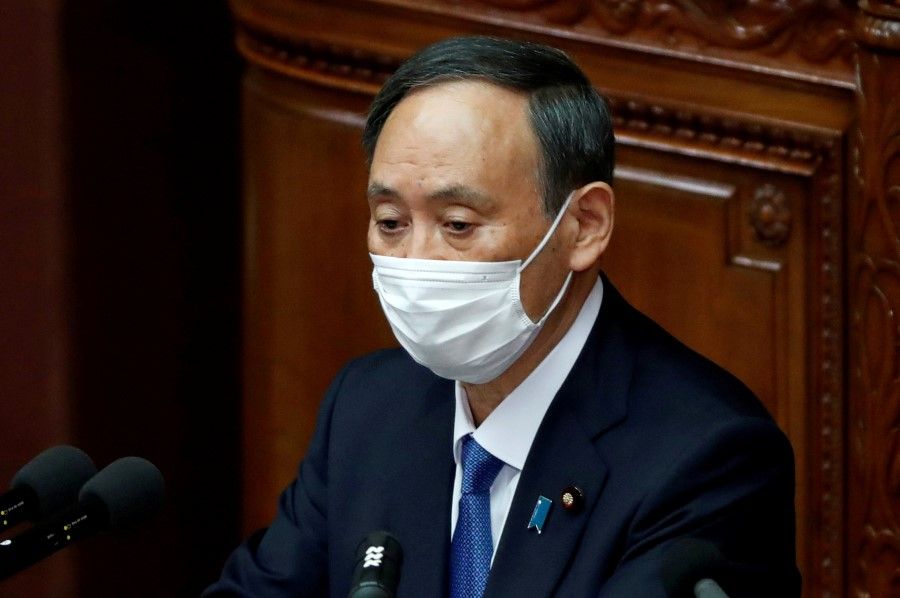
Vietnam as a potential Quad-Plus member?
Apart from Vietnam being regarded as the "cornerstone" of Japan's efforts to realise a Free and Open Indo-Pacific, there are indications that Japan is open to the idea of Vietnam being part of an expanded Quadrilateral grouping beyond the original four of Australia, India, Japan and the US.
In response to a media query on whether the Quad should include other members, the Japanese Minister for Foreign Affairs Motegi Toshimitsu said in October 2020 that Japan's FOIP framework allows "participation by all countries that share basic values such as freedom, democracy, the rule of law, and freedom of navigation", while adding that the ASEAN Outlook on the Indo-Pacific (AOIP) appears to share the same values and concepts. In other words, Japan seems open to the participation of countries such as Vietnam as long as they subscribe to certain basic values and shared rules.
The US seems to share Japan's thinking as well. Just before the second Quad ministerial-level meeting in Tokyo in October 2020 (less than two weeks before Suga's Vietnam visit), then US Secretary of State Mike Pompeo discussed the possibility of institutionalising the Quad network. Once this was done, Pompeo suggested that other countries could become part of this network at "the appropriate time".
Given Vietnam's strategic importance in the American efforts to counter China, as evinced by the visits of Pompeo and US National Security Adviser Robert O'Brien to the country in October and November 2020 respectively, it is very likely that the US will seek Vietnam's involvement should a Quad-Plus arrangement materialise.
Finding space amid US-China competition
On Vietnam's part, there is a new-found sense of confidence given the leadership's commendable efforts in containing the spread of Covid-19 and maintaining economic growth despite the global slowdown. Hanoi appears to welcome more engagement with the US and Japan, amid growing concerns over China's assertiveness in the region. In particular, Vietnam stated in its 2019 defence white paper that it is "ready to participate in security and defence cooperation mechanisms suitable to its capabilities and interests, including security and defence mechanisms in the Indo-Pacific region". Vietnam seems to be dangling the possibility of joining a regional security framework to increase its leverage against China.
However, Vietnam has refrained from committing to any specific grouping as it is not in Hanoi's interests to be seen as ganging up with other countries against China. In the same 2019 defense white paper, Vietnam reaffirmed its policy of not entering into any military alliance, avoiding any alliances with other countries to counter another country, and barring foreign military bases in Vietnam. While trying to avoid antagonising China, Vietnam is conveying an implicit message that it may be compelled to embrace a Quad-Plus framework if Chinese actions were to leave Hanoi with little maneuvering space.
Suga has largely followed in the footsteps of his predecessor Shinzo Abe to strengthen ties with Southeast Asia, with particular attention on Vietnam. This desire to forge closer and deeper ties with Vietnam is likely to be hastened by broader geostrategic trends, especially the US-China competition. The diversification of Japanese supply chains from China to Southeast Asia would also pave the way for closer economic cooperation between Japan and Vietnam. This will help Japan consolidate and enhance its defence and security ties with Vietnam, although both countries have been careful not to position these moves as being directed against any third country.
This article was first published as ISEAS Perspective 2021/31 Vietnam-Japan Relations: Growing Importance in Each Other's Eyes by ISEAS - Yusof Ishak Institute.
